No Future for Factory farming
Food systems
Factory farming is a global problem, that requires a global solution. A moratorium on factory farms is urgently needed to safeguard animals, our climate, health and the environment.
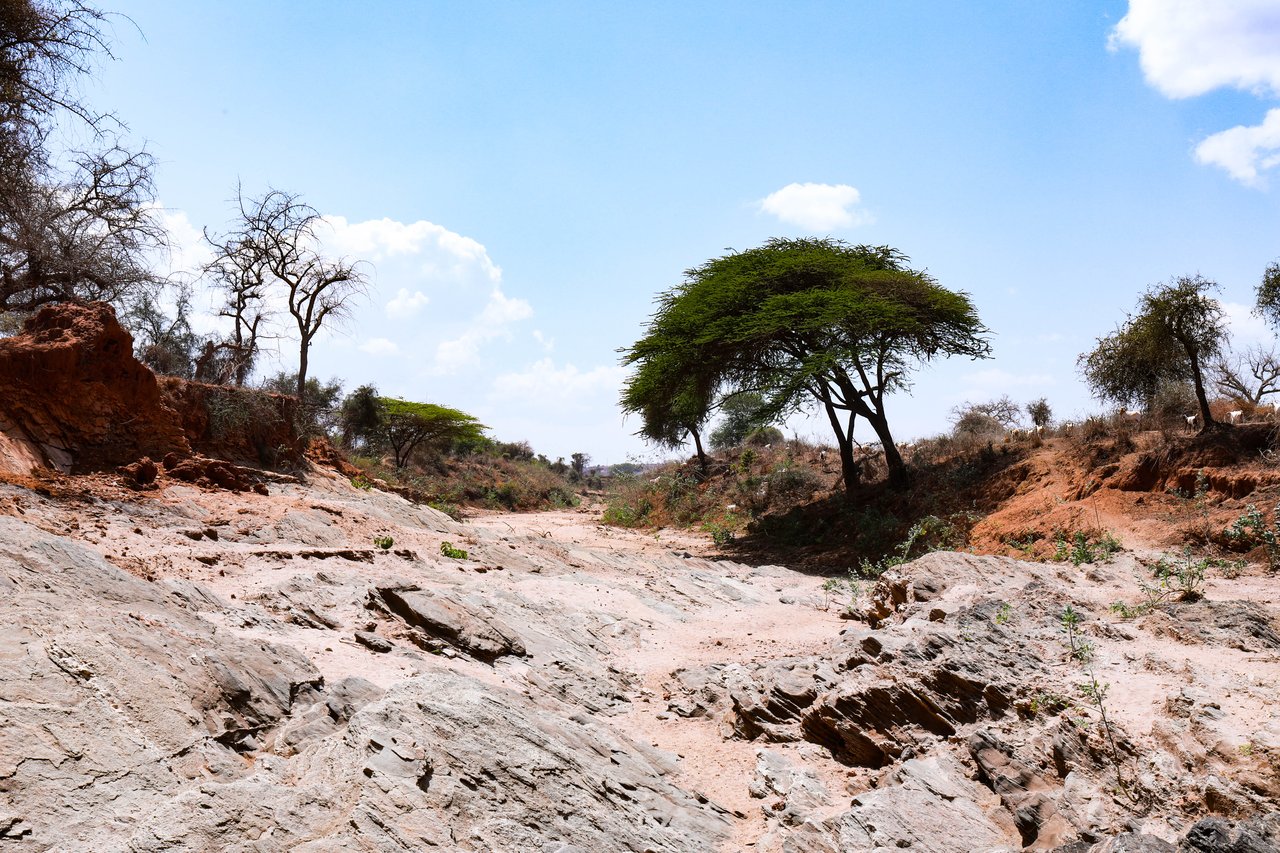
The destructive effects of climate change threaten both our planet and the animals we share it with. Yet one of the most significant contributors to global warming—the industrial animal agriculture sector—is too often overlooked.
Food systems
Factory farming is a global problem, that requires a global solution. A moratorium on factory farms is urgently needed to safeguard animals, our climate, health and the environment.
What are the effects of factory farming on the environment? World Animal Protection’s latest report seeks to answer this question and presents solutions to the climate crisis.
Our campaigns
Working to ensure farmed animals live good lives by transforming the global food system & attitudes towards farm animal welfare.
Factory farming is a leading culprit in driving climate change. The scale of industrial animal agriculture—where animals are confined to cruel, overcrowded conditions—comes with a massive environmental toll.
The industry's heavy reliance on crops grown to feed livestock results in widespread deforestation, especially in critical regions like the Amazon. These practices not only release large amounts of carbon into the atmosphere but also devastate vital wildlife habitats and threaten biodiversity. At the same time, factory farms are responsible for the suffering of billions of animals who live short, painful lives.
This urgent crisis calls for a transformation in how we produce and consume food, with an emphasis on humane, sustainable practices.
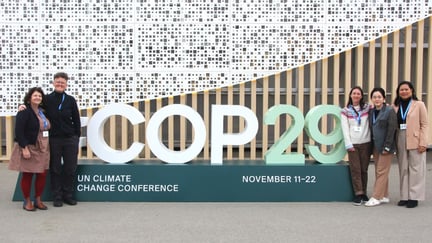
News
Read the roundup of COP29, where World Animal Protection advocated for animal welfare in the fight against climate...
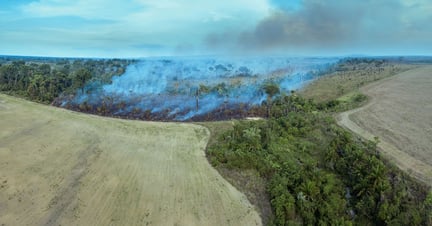
Blog
Explore our reports on factory farming and discover why governments need to act to protect our climate, wildlife...

News
Is meat consumption irrelevant to climate change? Rogan and Musk think so, but science tells a different story....
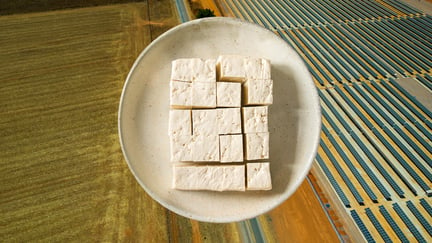
Blog
Debunking the misconception that soy foods and tofu protein are causing deforestation, when in reality 77% of soy...
The intensive, resource-hungry business model of factory farming is wreaking havoc on our environment. Without global trade in unsustainable animal feed crops, factory farming would crumble.
To combat climate change and protect animals, we need to reduce global animal protein production and consumption. Our call to action is clear: halve global animal protein consumption by 2040. This is not just about protecting the environment—it’s about protecting the animals, people, and communities that depend on a just and sustainable food system.
World Animal Protection is committed to driving this change, but we need your support. Governments, businesses, journalists, and individuals all have a role to play in shaping the future of our food system.
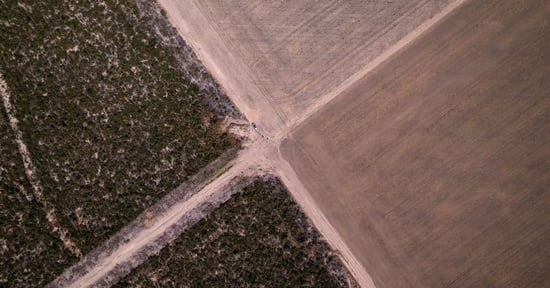
The world’s biggest meat supplier dodges the rules to put food on our tables
Brazilian conglomerate JBS involved in grain laundering, land grabs, deforestation and animal cruelty.
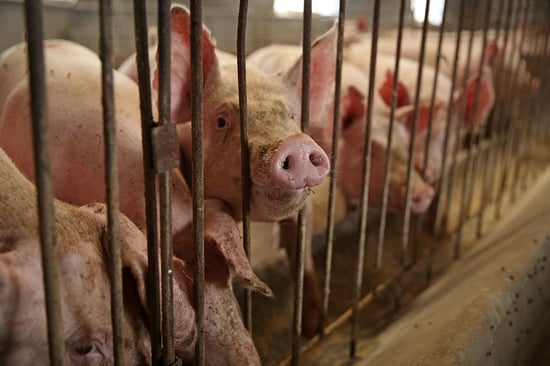
Revealing the true impact of factory farming
World Animal Protection is sharing results from the world’s first study to measure the potential climate and environmental benefits of eating less factory farmed chicken and pork.
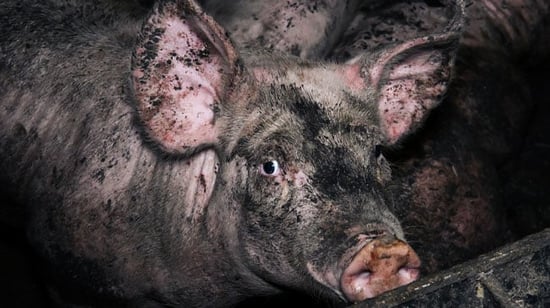
The biggest component of emissions comes from producing feed for animals
Our carbon life cycle assessment scorecard finds that together, the world’s 5 biggest factory farming companies slaughter 11.5 billion chickens and 150 million pigs every year.
At World Animal Protection, we’ve been working to raise awareness and drive change at the highest levels. We’ve attended every COP since COP26, pushing for climate action that accounts for animal welfare and the need to transition to humane, sustainable food systems.
The current global food system—dominated by industrial meat production—is unsustainable. It’s time for national governments, particularly in high-meat consuming countries, to set stronger Nationally Determined Contributions (NDCs) that address the urgent need to transform food systems. This transformation must not only mitigate climate change but also protect food security, safeguard biodiversity, and improve animal welfare.
Press release
Baku, Azerbaijan — World Animal Protection, a leading global charity focused on the impact of factory farming on human health, the environment and on farmed and wild animals, will be on the ground at COP29 for on-the-record quotes and backgrounders for journalists covering the conference.
News
Read the COP28 highlights from the World Animal Protection delegates from their experiences at this year's climate summit in Dubai.
Press release
20 November, Sharm El-Sheikh COP27, Egypt: World Animal Protection welcomes COP27’s recognition of agriculture and food systems as a significant component of climate change action - but warns failure to urgently tackle emissions from industrial livestock farming will make it impossible to halt and reverse global warming.
Governments must adopt policies that cap the expansion of factory farming to reduce greenhouse gas emissions, protect wildlife habitats, and reduce the suffering of billions of animals each year.
A “Just Transition” is needed—one that shifts away from industrial animal agriculture and invests in sustainable, humane alternatives like agroecological systems. By redirecting subsidies and increasing financial support for these systems, we can create a future where food production is equitable, sustainable, and cruelty-free.
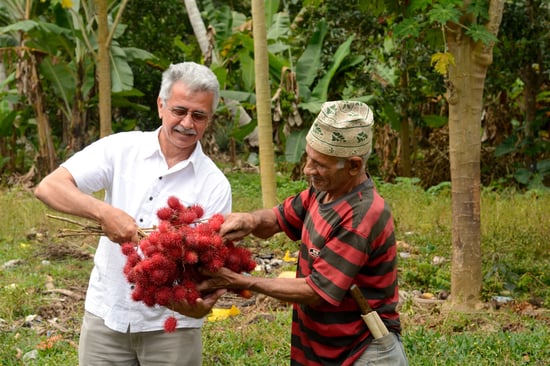
A shift away from industrial animal agriculture toward sustainable and humane alternatives like agroecological systems.
The Just Transition from Industrial Animal Production to Equitable, Humane and Sustainable Food Systems white paper and roadmap was co-produced with more than 50 contributors from organisations dedicated to ensuring a just transition away from the industrial animal agriculture system
For Policymakers: Join us in pushing for stronger NDCs that address the impacts of industrial animal agriculture on climate change and animal welfare. Advocate for the transition to humane, sustainable food systems.
For Businesses: Support sustainable food production and move away from the environmental and ethical risks associated with factory farming.
For Journalists: Help raise awareness of the links between animal welfare, factory farming, and climate change. Amplify the voices calling for a just transition in food systems.
For Individuals: Take action by reducing meat consumption, supporting plant-based alternatives, and advocating for change in your communities.
Together, we can protect animals, protect the planet, and secure a sustainable future for all.
Find out how you can support us in our work to move the world to protect animals both in the wild and commercial food systems. Take action now!
Sign up to hear about the work World Animal Protection is doing to end animal cruelty, and learn what vital actions you can take to protect animals

Press release
World Animal Protection is deeply concerned by the announcement that JBS, one of the world’s largest food companies,...

Press release
World Animal Protection today issued a stark warning following the conclusion of COP29, which saw the finance package...